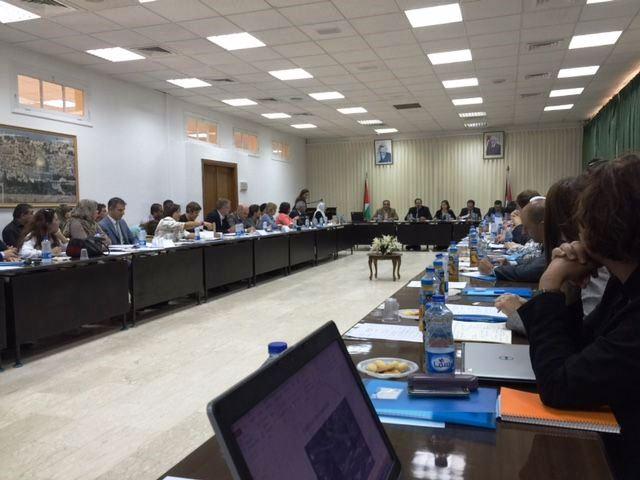Education partners and policy makers meet in Ramallah at the Education Sector Working Group*
Ramallah
- On 21 September 2016 the third Education Sector Working Group (ESWG) of the
year took place in Ramallah at the Ministry of Education and Higher Education
(MoEHE). This Working Group
brings together key education stakeholders in the Palestinian Territory such as
senior officials of the MoEHE, local and international civil society and development
partners.
His Excellency the Minister
of Education and Higher Education, Dr. Sabri Saidam, updated the Working
Group on recent developments made such as the curriculum reform, the new “Tawjihi” system that is being
implemented in the West Bank and Gaza and the inclusion of Technical and
Vocational Training and Education (TVET) modules in grades from 7th to 9th in 158 schools since the beginning of the school year. The Minister stated that “We hope to include more schools in the future, but this will happen
gradually. The schools need to be equipped and more teachers need to receive
the appropriate training.” Furthermore, he also referred to steps leading
towards the approval of the new education law, to the situation of Education in
East Jerusalem, and to the intention of making pre-school education compulsory.
His Excellency expressed his gratitude for all the progress achieved and
thanked the “education family for its
continuous support.”
Mrs. Florence Duvieusart, Consul and Head of Development Cooperation at
the Consulate General of Belgium, speaking
on behalf of the Joint Financial Partners (JFPs) and as co-chair of the
Education Sector Working Group, mentioned the recent school visits in Gaza
and stressed the importance of the M&E report. She highlighted "the
revitalization of the Higher Council for TVET as a crucial and promising
breakthrough in the concerted efforts to upgrade and upscale Vocational
education" and the low illiteracy rate in the Palestinian Territories. Finally, she mentioned the significant progress
obtained both at primary and at secondary level in terms of providing
qualified teachers, while stressing the importance
for further efforts on student centered learning and the use of educational
resources.
UNESCO, as the technical advisor to the Education Sector Working Group, commended the MoEHE for its effective contribution to
the preparation of the Government’s National Policy Agenda setting out the
vision for Palestine over the period 2017-2022. UNESCO
Representative to Palestine, Dr. Lodovico Folin Calabi, reiterated that “the Education Sector Working Group is the
natural platform for discussing and designing the most updated policies needed
for ensuring inclusive and equitable quality education for all Palestinian
children and youth”.
During the break, the Ministry of
Education and Higher Education together with the European Union have organized
an event for the International Day of Peace. A thousand Palestinian children released
white pigeons and balloons from the courtyard of the Ministry of Education
marked with inscriptions reading “We want to live in peace” into the air.
Afterwards, the MoEHE presented the Monitoring and Evaluation report
from school districts and the indicators from East-Jerusalem schools. The event
was closed by updates from the Technical Working Groups on progress made in the
past three months.
In preparation of the ESWG, representatives of the Ministry, UNESCO and
the main partners in the education sector, had visited on Monday 19 September
three different schools in Gaza, implementing TVET, inclusive education, and
special needs education programmes and located in Access Restricted Area.
The Education Sector Working Group is held every three months to assess
and discuss achievements, challenges and ways forward in the education sector,
also in a view of a better coordination of international aid cooperation
towards the advancement of Education in Palestine. The MoEHE’s regular meetings with
the donor community are prepared for and coordinated by Dr. Sakeena Elayan, the
academic advisor of the Minister of Education and Higher Education.
*This article is based on a press release from UNESCO Palestine.
Latest news from this project
No news

